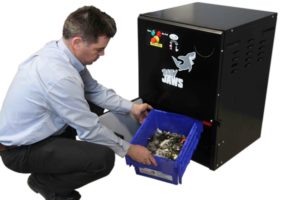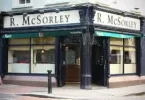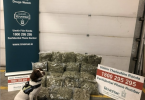Don’t waste your packaging waste money
As a publican you’re ‘a producer’. Bet a few of you didn’t know that. But once you’ve sold the contents of those bottles, cans and plastic food containers, you’re left with a headache in that all producers of packaging waste – that’s you – must now segregate this waste (glass, steel, aluminium, paper, fibreboard, wood and plastics etc) into specified ‘waste streams’ by law and have it collected by authorised recycling operators.
Alternatively you may be legally obliged to participate in a recovery scheme operated by the sole authorised body, Repak, or take the ‘individual’ or ‘self-compliance’ route.
As part of the EU Landfill Directives, Irish legislation in relation to food waste from pubs means that specified premises (including pubs) cannot dispose of food to landfill.
This has presented the publican serving food with quite a lot of extra work and expense in either treating this food waste onsite or arranging for its disposal through an authorised collector in the absencer of any local authority food waste collection service.
But what about packaging waste?
Waste Management Packaging Regulations
Introduced in 1997, these are subject to amendment but their main purpose is to assist Ireland achieve national packaging recovery targets as set out under EU Directive 94/62/EC.
The European Union (Packaging) Regulations 2014 came into effect on 21st June 2014 and place obligations on companies that place packaging, packaging material or packaged products on the Irish market. All such ‘Producers’ must segregate their packaging waste into specified waste streams and ensure that it’s recycled or recovered by an authorised waste contractor. Producers with a turnover of more than €1m that place more than 10 tonnes per annum of packaging onto the home market (Major Producer) are further obligated to either join Repak or register with their Local Authority (Self Compliance).
As a result, publicans must segregate the various types of packaging waste into glass, plastic, tin, paper, cardboard etc themselves. Obviously it makes sense to minimise the amount of this being produced.
According to Maurice J Bergin of GreenHospitality.ie & Green Travel.ie, “The bottom line is any pub with a turnover in excess of €1,000,000 and with 10 tonnes of glass waste collected annually falls into the Major Producer category which has specific legal compliance requirements.
“We’ve estimated that a licensed premise with a €1m turnover will have around 20 tonnes of non-returnable bottles. Each waste collector can advise what tonnage was collected over the last 12 months (https://www.repak.ie/for-business/members/become-a-repak-member/). Our advice to hotels and pubs etc is that if they’re a Major Producer, join Repak to achieve compliance.”
At Andy’s Bar in Monaghan town Sean Redmond separates out his packaging waste into different streams as required and has them taken away for around €20 a month.
“The more you can divert into recycling the better,” he says, adding that it’s important to put the waste into clearly-marked plastic bags for easier identification, for example plastic containers for bleach or washing-up liquid should not be sent with general packaging waste.
He remembers not too long ago bottles used be recycled up to seven times. But today they’re all ‘single use’.
Sean’s packaging waste is destined for a 240 litre bin. A 240 litre bin holds about 330 mixed bottles. Sean knows this because one day he had the bin emptied out in the back yard and the number of spirits, wine, beer, mixer bottles etc were counted.
“That means that each ‘lift’ for €6 to €8 works out at about 2 cent per bottle,” he calculated.
Where his own pub’s 240 litre container gets lifted about 1.5 times a week he reckons that the average pub would more likelty get one lift a week where a hotel might have six to 10 lifts and a city centre pub about half-a-dozen.
Sean’s biggest packaging waste management headache is the sheer amount of unnecessary waste generated by suppliers.
“Goods sometimes come overpackaged,” he says, “Plastic crates that could be used again would be better. Sometimes if you get a container it could have different elements such as a cardboard vessel and a plastic pouring spout.
“Then there’s packaging like polystyrene that’s quite hard to dispose of,” he points out, “We wash it and try to get them to take it back.”
Save on disposal costs with PEL waste reduction equipment

PEL Waste Reduction Equipment, a leading manufacturer of balers, bin compactors and bottle crushers, reduces waste disposal costs for the hospitality industry.
It offers three main product lines: glass bottle crushers spanning the ‘Baby Jaws’ under-the-counter machine (which keeps staff serving customers rather than managing the waste glass bottles in the bar area) to the volume-fed ‘Mega Jaws’ machine (capable of crushing up to 4,000 bottles per hour) to the BB09 ‘Mighty Jaws’ stand-alone machine.
The PEL baler portfolio consists of four machines, all of which reduce cardboard and plastic waste volumes by 80-90%.
PEL’s refuse Bin Compactors are suitable for 240 litre, 360 litre, 660 litre and 1,100 litre bin sizes and save customers by reducing the number of waste bins required to manage their general and recycling wastes.
All PEL waste reduction equipment products can be purchased or rented, meaning immediate waste disposal cost savings for no capital outlay.
The products, manufactured to the ISO9001 Quality Standard, are CE Certified.
Call Tommy on 087-2054300 for more details on how PEL Waste Reduction Equipment can save on your waste disposal costs with no capital outlay.
Repak – a member-based organisation
Any hotel or bar with a turnover greater than €1 million that places 10 tonnes or more of packaging on the market (ie glass & plastic bottles primarily consumed on your premises) is asked to comply with the Packaging Regulations.
Repak is here to help. It’s a member-based organisation set up by industry and it provides compliance to obligated business for their packaging waste at the lowest practical cost. Repak ensures that Ireland meet its EU packaging recycling targets and acts as a lead advocate for environmental education and behavioural change for best recycling practices on its members’ behalf.
Over 2,100 businesses across Ireland recognise the collective benefits of Repak membership. Repak fulfils your legal compliance under the EU Packaging Regulations in a cost-effective way. It also represents members’ best interests in new legislative consultation and in protecting business from costly proposed EU changes. It provides training for members in compliance and recycling best practice.
Repak uses the money contributed by its members to subsidise the recycling of their packaging materials to achieve recycling targets set by Government. This includes packaging materials collected from households, bring banks, civic amenity site and your business.








